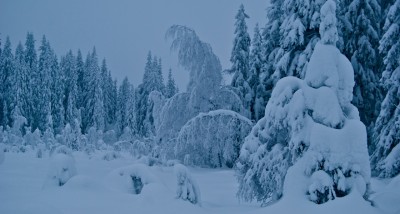Climate researchers and state meteorologists are forecasting a much milder winter than the past two in Norway, while ski resort operators have been forced to postpone the opening of the ski season once again because of lack of snow. Meanwhile, political efforts to reverse climate change seem to have melted along with the ice.

Only two ski resorts in the entire country were to be open this weekend: Strandafjellet in the alps of Sunnmøre on the northwest coast, and Galdhøpiggen Summer Ski Center, which could report 50 centimeters of new snow. Other ski resorts have no snow at all and it’s too warm to make any.
They’re losing millions in revenues because of the delay in the start of the ski season. The popular ski runs at Hemsedal, for example, were supposed to open last weekend, but the mild weather spoiled that. Nor have generally snow-secure spots like Bjorli, Trysil and Beitostølen been able to open, with the latter finally forced to cancel an upcoming World Cup competition. Organizers were planning to move it to Sjusjøen in the mountains above Lillehammer.
The late autumn and early winter have simply been alarmingly warm, renewing fears over climate change that seemed to subside when the weather turned bitterly cold over the last two winters. The entire climate debate seemed to die off and many Norwegian environmentalists are frustrated and embarrassed over Norway’s own lack of progress on making emissions cuts.
More backsliding
This week brought news that the Finance Ministry thinks cuts need to be made outside Norway but not within the country. Norway’s oil industry makes climate cuts at home difficult and wildly expensive, so even Norway’s allegedly environmentally conscious government now proposes cutting emissions though the purchase of climate quotas abroad.
Meanwhile, the government’s own long-term plan to help reverse climate change is more than a year delayed, influential labour unions claim climate measures will threaten Norwegian industry and jobs, and Norway’s own Oil & Energy Minister Ola Borten Moe publicly praised Statoil’s controversial oil sands project in Canada and criticized EU proposals to keep oil sands oil out of Europe.
Moe ended up being scolded not only by other government ministers but by his own party leader, Liv Signe Navarsete, when he returned from a trip to Canada, Alaska and the Pacific Northwest. Newspaper Dagsavisen reported that Moe received “a strong message” from Navarsete to concentrate more on renewable energy and less on controversial oil projects. Other top officials of the Center Party were also reported to be upset with Moe and unhappy over the controversy he sparked in Canada.
As newspaper Dagens Næringsliv (DN) editorialized this week, Moe managed to once again infuriate the environmental movement and annoy both Norway’s environmental minister Erik Solheim and his party’s own environmental spokesman Erling Sande. “For the government, this is getting quite embarrassing,” DN wrote. “What politics really apply? Moe’s? Solheim’s?”
Sun turned, more warmth
It did put climate issues back on the agenda, just before the next UN climate summit in Durban and just as climate experts warned that global temperatures could rise as much as six full degrees if emissions aren’t curtailed. While last year’s winter was the coldest on record in many places in Norway, temperatures over the next three months are expected to be two full degrees above normal. Pål Brekke of the Norwegian Space Center said the sun has turned and is rising higher with stronger ultraviolet radiation. That suggests mild weather both this winter and next.
One piece of good news for Statoil’s embattled oil sands project emerged as well this week: Fatih Birol, chief economist at the International Energy Agency (IEA) told newspaper Aftenposten that it may “only” generate emissions that are 15 percent higher than emissions from more conventional oil extraction processes. Given the world’s need for oil, especially from countries outside the Middle East and Africa, Birol said he welcomes Statoil’s investment in the oil sands.
Views and News from Norway/Nina Berglund
Please support our stories by clicking on the “Donate” button now:

